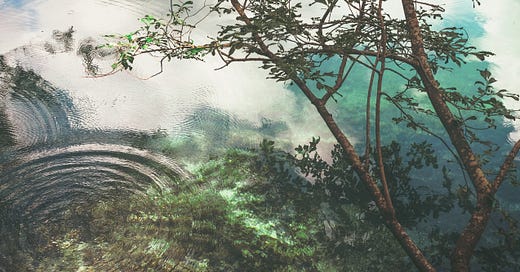The water in a vessel is sparkling;
the water in the sea is dark.
The small truth has words which are clear;
the great truth has great silence.
〰 Rabindranath Tagore 〰
An Ear for Language ~ Listening through a Shell
We have two ears and one mouth
so that we can listen twice as much as we speak.
〰 Epictetus 〰
The word language is not limited to verbal interlocution. It has been widened and stretched to cover all kinds of human communication. Some of them involving the human body ~ like body language, non-verbal communication with hand signs, eye movements, and facial expressions.
Languages beyond these familiar communications are Floriography (18th c., a language of flower arrangement), Solresol (1827, a musical language), Lingua Ignota (12th c., a secret language created by German abbess Hildegard v. Bingen and her nuns), languages of dance from all cultures, and countless others.
Body language (the movements and postures of the body) has become a field of study in its own right. Sign language (speaking through hand gestures) has been developed all over the world to enable communication for and with people who are deaf or hard of hearing.
Such variations ~ especially those that no longer have the anatomical connection with the tongue (see my previous word cast The Mouthpiece of Language)~ demonstrate the use of the word language as a metaphor.
Relying on their observations of relationship between languages, etymologists have gifted us with the concept of language families. Taking their cue from family trees, they have taken a small leap of faith and created language trees.
Linking tongues to words, words to roots, roots to plants, and plant morphology to trees is based on conflating the metaphorical use of the words language/ tongue with their actual meaning.
Language trees have inspired generations of artists, linguists, etymologists and anyone who digs a little into the roots of words. However, anthropocentric explanations and discourses about language focus far too much on the oral cavity and the voice box ~ the organs responsible for diction, pronouncing, speaking and articulating those words.
If the mouth was the most important organ in learning to speak a language, perhaps knowledge of and familiarity with language would be already implanted into us in seedform. We’d only need to open our mouth and make sounds, and the language tree would start to sprout.
But that’s not how it works. Sounds performed by voice and tongue and expelled through parted lips are only part of the production. To learn a language we need to hear others speak in that ‘tongue’ and immerse ourselves in the vibrations of the soundscape generated by their verbiage.
For such language experiences we are blessed with a pair of ears. The outer ear, incidentally, shares its name with a large sea shell, concha [from Greek konkhē = mussle, mollusk] and the inner ear with a spiralling sea snail called cochlea [from Greek kokhlos = shellfish with a spiralling shell].
Various channels connect concha and cochlea with one another as well as the inner ear with the nose and throat. The cochlea itself is a spiralling channel filled with fluid which responds to sounds. Part of the cochlea is covered with tiny hair cells which move in response to the vibrating fluid, very much like delicate plants on the seafloor get moved by ocean currents.
The best way to learn a new language is to immerse yourself in an environment and culture where native speakers communicate in this tongue, to let the tiny hair in your cochlea be moved by the unfamiliar currents.
Like a child who learns the mother tongue of her kin by osmosis, we become fluent by assimilating the soundscape of native speakers. In other words, instead of looking at language as a headland, forever clinging to the shore, we are invited to jump into the river where the mouth meets the open sea.
Tacit Language Trapped
There is a huge silence inside each of us that beckons us into itself.
〰 Meister Eckhart 〰
In his autobiographical novel Die Erfindung des Lebens (The Invention of Life) Hanns Josef Ortheil tells the story of a young man from childhood until his first successes as a writer.
This story begins in postwar Cologne. The five-year-old protagonist has never uttered a word. His mother is mute, the parents communicate through written notes. Nobody engages with the child in spoken words. The family has settled into wordless ways of interacting, and the boy grows up without the acoustic soundscape of audible language.
One day, a grand piano arrives in this silent home. The mother polishes the instrument daily but never plays. When the keyboard attracts the boy’s attention, his mother begins to teach him. Music becomes his first language.
At school, the boy has great difficulty to learn in the expected ways. Reading and writing remain a challenge. After two years of struggling to keep up with the curriculum, his teacher and headmaster suggest that the mute boy would be better off attending a school for children with special needs, known as ‘idiots’ school’. He’d never be able to express himself in language like a normal child, so the explanation.
The father, recognising that his son needs to interact with people who speak to him and treat him like a normal child, rejects the teachers’ prognosis. The parents agree on a temporary separation, for the sake of the boy’s language development. The father takes him out of school and designs a personal daily learning program in nature. A few months later, the spell of speechlessness is broken.
Towards the end of the novel, the protagonist ~ now a young man ~ learns that he has four brothers. His parents lost their first four children, each at a young age, during or soon after the end of WWII. When the fourth baby died, the mother lost her speech.
Aphasia ~ the inability to speak ~ is a language disorder resulting from damage to specific brain regions responsible for communication, typically affecting speech production, comprehension, reading, and writing.
In Ortheil’s story, based on personal experience, the mother lost her speech due to repeated trauma. The grief of loss was so overwhelming that it blocked her ability to communicate in words. The mother’s aphasia was passed on directly to her only surviving son, as if by osmosis.
For it is the fate of a woman Long to be patient and silent, to wait like a ghost that is speechless, Till some questioning voice dissolves the spell of its silence. Hence is the inner life of so many suffering women Sunless and silent and deep, like subterranean rivers Running through caverns of darkness. (Henry Wadsworth Longfellow, from the poem The Courtship of Miles Standish)
Implicit Communication
Perhaps there is a language which is not made of words
and everything in the world understands it.
〰 Frances Hodgson Burnett 〰
My mother was born into a family of business owners and devout Christians, part of the first Brethren community in Germany, co-founded by her great-grandfather Julius Löwen. She was a picture-book child of a ‘good girl’.
At the age of three, she would delight her parents by getting ready for bed before any adult told her, and then wait for her mother to find her. From the age of five, when driving to the North Sea islands for the summer vacation, she would readily choose to sit in the middle, so her elder brother and younger sister could each have a coveted window seat.
To the uninitiated observer, it looked like this ‘goodness’ was in her nature. Everyone praised her for it. That praise filled her with much pride, while harbouring unspoken resentment for decades to come.
What makes a small child strive to please her parents to such an extreme, she denies herself what she really wants? Nobody gave her these explicit instructions. Where does such an urge come from?
Children in the Löwen-family were expected to behave within the zeitgeist of being seen but not heard. On weekdays they were served their meals in the kitchen by the housekeeper. Only on Sundays and special occasions would they share a meal with the parents in the grownup dining room, among polished dark furniture, damask table cloths stiff with starch, gleaming silver ware, oil paintings in gold frames, and the scent of fresh wax rubbed into the parquet floor.
The family would attend their religious gatherings once during the week and twice on Sundays. The children, born and bred in a virtual village of kindred folk with a pure mindset and chosen language, never had their mouths washed with soap, any dirty words carefully filtered out before they could reach those delicate and perceptive young ears.
Language, as we know, does not only consist of spoken words. Language is filled with lacunæ [diminutive of Latin lacus = ‘little lakes’] ~ lacks, gaps, unfilled spaces between the words. Language speaks through the body’s gestures and facial expressions, through gifts and withholding of attention. Sometimes a raised eyebrow says more than a hundred words.
What makes humans fulfil the wishes of autocrats without spoken command or order?
How does osmotic communication between humans happen?
The Polluted Ocean of Languaging
Words are both our instrument of truth and our weapon of distortion.
〰 Maria Popova 〰
Languaging was born from the minds of our human ancestors as a tool for communication. Sooner rather than later they discovered how to use this tool against each other as a weapon.
The old saying ‘sticks and stones can break my bones but words can never hurt me’ is a lie. Humans are being dragged from their homes, arrested, thrown into prison, tortured and killed because of words. Words they have spoken or written, expressing their thoughts, are held against them, as if they’d committed a heinous crime.
Language is used as a weapon for manipulation, deception, coercion, corruption and authoritarian power of some humans over mankind.
Can we blame language for this? Isn’t it the mindset, shaped by certain beliefs and ways of thinking, employing the process of languaging in aggressive, violent manners?
“The essence of lying is in deception, not in words,” John Ruskin refreshes our collective memory.
“If thought corrupts language,” George Orwell muses, “language can also corrupt thought.”
“Words are the clothes thoughts wear,” Samuel Beckett confirms in a thinly veiled figure of speech.
So here we have a chicken or egg situation. Languaging and thinking swim in the same lakes and rivers. Their waters flow in the very riverbeds that also hold, shape, and are shaped by our beliefs, faith, doubts, emotions, dreams, ideas, wishes, desires, yearnings and existential questions.
When those riverbeds are polluted, their waters continue to pour themselves into the ocean of languaging. Selling the human mind down the river of manmade progress doesn’t clear the mud, as long as the soiling is churned out of the same mental soil.
Polluting the ocean of languaging has a long history. Human efforts to deal with that pollution are significantly younger. It’s not going to be cleared up by washing our children’s mouths with soap.
Any type of washing ~ be it whitewashing, greenwashing, blackwashing, footwashing, cloudwashing, or brainwashing ~ won’t resolve the issue. Because washing is watering. Rivers and oceans can’t be washed. They do the watering.
Water cleanses itself through movement, generating its own spiralling flow, regenerating itself through currents and waves, ebbs and tides, springing from the source, filtering through aquifers, winding through riverbeds, quickening along rapids, gushing back into the ocean, leaving the flotsam and jetsam on banks and shores.
When the polluted ocean of languaging is dying, starved of its vitality, surely that ocean waits for our creativity to call forth its riches ~ to paraphrase Rainer Maria Rilke.
If your ocean of languaging seems poor, do not blame it;
blame yourself that you are not poet enough to call forth its riches.
LANGUAGES Carl Sandburg (written in 1916) THERE are no handles upon a language Whereby men take hold of it And mark it with signs for its remembrance. It is a river, this language, Once in a thousand years Breaking a new course Changing its way to the ocean. It is mountain effluvia Moving to valleys And from nation to nation Crossing borders and mixing. Languages die like rivers. Words wrapped round your tongue today And broken to shape of thought Between your teeth and lips speaking Now and today Shall be faded hieroglyphics Ten thousand years from now. Sing—and singing—remember Your song dies and changes And is not here to-morrow Any more than the wind Blowing ten thousand years ago.








Hi Veronika,
'Wow ... wow ... wow, this is brilliant', was repeatedly in my thoughts and on my lips as I read this. So beautifully written, it just flows. 🌀
The story, the poem, your family’s example of how communication is so much more than what is spoken. How your mother felt to make the choices she did, the power of the unspoken. How we take that to adulthood, “What makes humans fulfil the wishes of autocrats without spoken command or order?” I have been sitting with that for a bit today, in light of my current post.
Music — I remember when I started learning classical piano, I was taken by the emotion in the music and as a ten year old kid I was wrapped that I could play a language understood by everyone. Music does elevate us to other places. And then, as a beginning EAL teacher, I used music to help a Turkish boy read. We recited -sang rhymes as we played them on a keyboard. His language processing was delayed though he would gravitate to the instruments. Our English class was in the music room.
Learning a language, “jumping in the river where the mouth meets the open sea”, I can relate to this from an observational and teacher perspective, of the CALD communities we worked with.
And then there are the many contexts of silence, “so silence can, according to circumstance, speak.” And Orwell’s point you highlight, the power language yields.
And that language is culture and identity, so important in the too many examples of people being forbidden aspects of themselves. Too many languages lost.
The fluidity and evolution of language. Just a beautiful exploration Veronika, with much for us to think about.
“Water cleanses itself through movement, generating its own spiralling flow, regenerating itself through currents and waves, ebbs and tides, springing from the source, filtering through aquifers, winding through riverbeds, quickening along rapids, gushing back into the ocean, leaving the flotsam and jetsam on banks and shores.”
Beautiful
Thank you 🙏 🌱 💙
Language & communication has always fascinated me. I immersed myself in ASL in college and was mesmerized by the culture, the language, the subtle cues they share.
This is beautifully written, thank you for sharing it. Music as a 1st language, just that concept you wrote about has me curious. Humans are capable of so much.